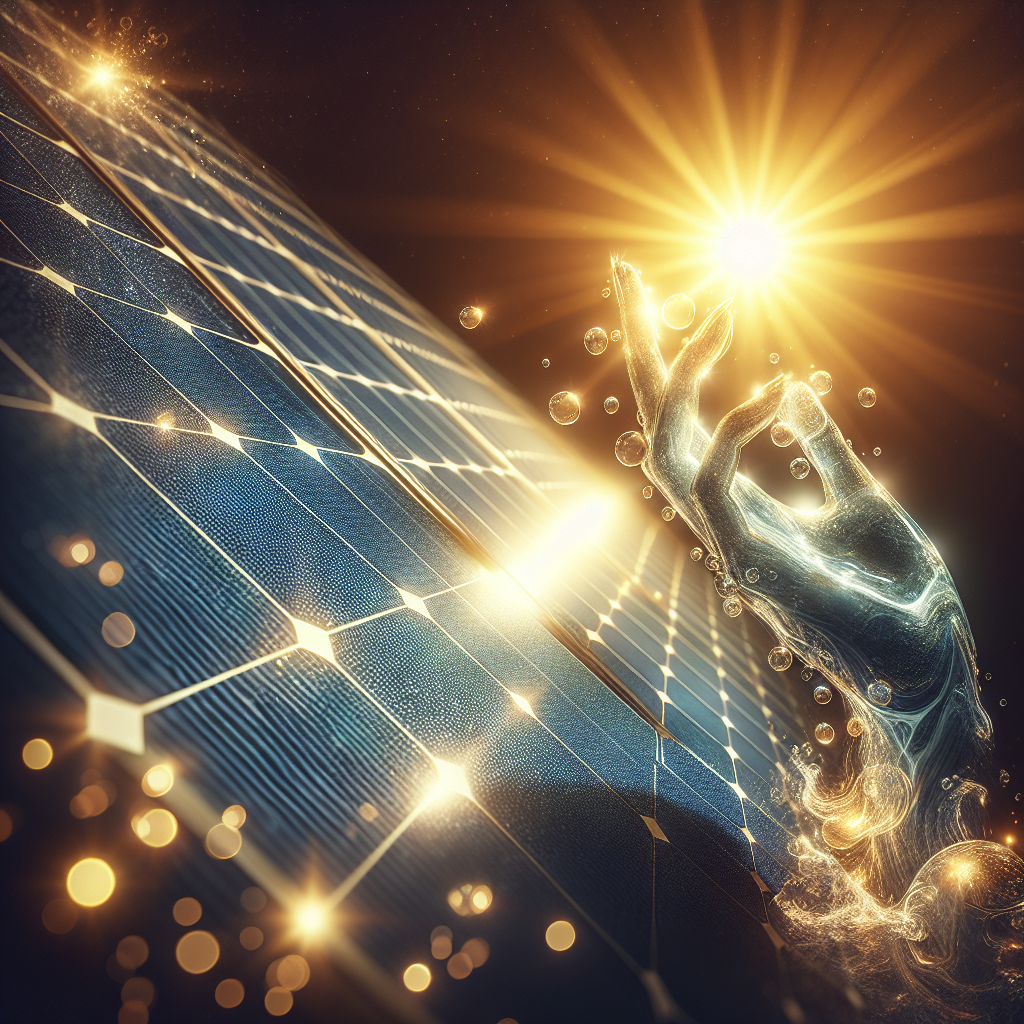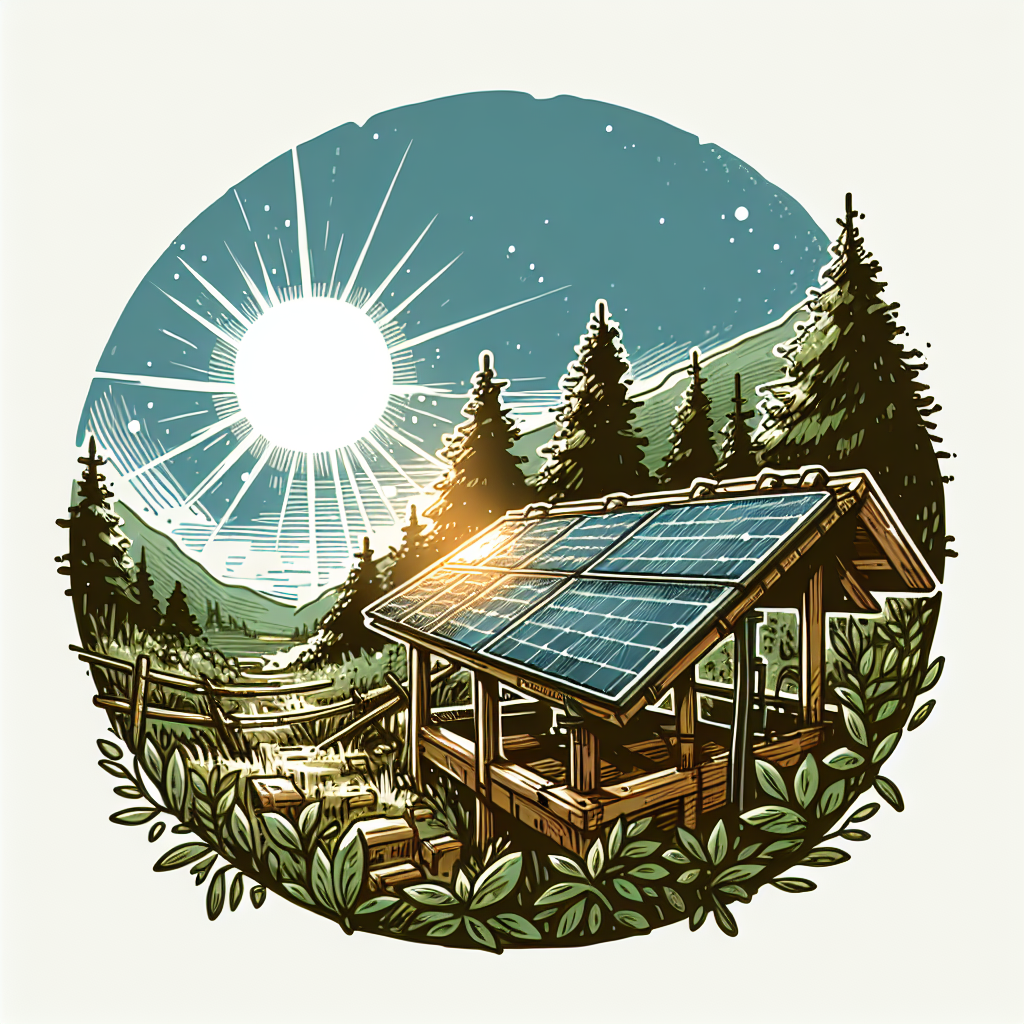Living off the grid can be a rewarding and fulfilling way of life, but it also comes with its unique challenges. One of the key aspects of successful off-grid living is mastering energy efficiency. In this article, you will discover practical and sustainable practices that can help you reduce your energy consumption, harness renewable sources, and ultimately, create a more self-reliant and environmentally-friendly lifestyle. From solar panels to passive house design, this article will guide you towards a more energy-efficient way of living off the grid.

Understanding Off-Grid Living
What is Off-Grid Living?
Off-grid living refers to a lifestyle where individuals or families rely on renewable energy sources and are disconnected from the traditional power grid. Instead of relying on the electricity supplied by utility companies, off-grid living involves generating and storing energy independently. This lifestyle choice provides individuals with a greater sense of self-reliance and a reduced environmental impact.
Advantages of Off-Grid Living
There are numerous advantages to choosing an off-grid lifestyle. One of the primary benefits is the reduced reliance on fossil fuels and the ability to minimize the ecological footprint. By generating energy from renewable sources, such as solar, wind, hydro, geothermal, or biomass power, individuals can contribute to a cleaner and more sustainable environment. Additionally, off-grid living allows for increased energy independence, reduced energy costs in the long run, and the ability to live in remote areas without access to the power grid.
Energy Efficiency and Off-Grid Living
The Importance of Energy Efficiency
Energy efficiency plays a crucial role in off-grid living. By optimizing the use of energy within a household, individuals can ensure that their energy generation systems are sufficient to meet their needs while minimizing waste. Energy efficiency not only reduces the environmental impact but also extends the lifespan of energy storage systems and reduces the burden on renewable energy sources.
Benefits of Energy Efficiency in Off-Grid Living
In the context of off-grid living, energy efficiency offers several benefits. Firstly, it allows individuals to make the most of their limited energy resources, ensuring that they can meet their energy needs without relying on backup generators or compromising their lifestyle. Secondly, energy efficiency contributes to cost savings, as it reduces the overall energy consumption and subsequent expenses related to energy generation and storage. Lastly, by prioritizing energy efficiency, off-grid individuals actively contribute to a sustainable future and set an example for others.
Challenges of Energy Efficiency in Off-Grid Living
While energy efficiency is highly advantageous for off-grid living, it can also present challenges. One of the primary hurdles is optimizing energy usage without compromising comfort and convenience. Additionally, the initial investment required for energy-efficient appliances and systems can deter some individuals from pursuing this lifestyle. However, with the availability of incentives, rebates, and advancements in technology, these challenges can be addressed, making energy efficiency an achievable goal for off-grid living.
Assessing Energy Needs
Understanding Your Energy Requirements
Assessing energy needs is a crucial step in off-grid living. It is essential to understand how much energy is required to power various appliances, lighting, heating, cooling, and other electrical needs within your household. By conducting a thorough energy audit, you can identify areas where energy consumption can be reduced or optimized, leading to more efficient energy generation and storage.
Determining Peak Energy Demands
Determining peak energy demands is equally important when living off-grid. Peak energy demands refer to the periods of highest energy consumption within a household, such as when multiple appliances are being used simultaneously, or during extreme weather conditions. By understanding your peak energy demands, you can ensure that your energy generation and storage systems are capable of meeting these requirements without any interruptions or compromises in energy supply.
Energy Generation Systems
Solar Power
Solar power is one of the most popular and widely implemented energy generation systems for off-grid living. Harnessing the sun’s energy through solar panels, solar power systems convert sunlight into electricity. It offers a clean, renewable, and abundant source of energy. Solar power systems can be customized to meet individual energy needs, whether it’s a small system for a tiny home or a larger system for a more significant energy demand. With advancements in technology, solar panels have become more efficient and cost-effective, making them an excellent choice for off-grid living.
Wind Power
Wind power is another viable option for off-grid energy generation. By utilizing wind turbines, the kinetic energy of the wind is converted into electrical energy. Wind power systems are most effective in areas with consistent and strong winds. While wind power requires initial investments in turbines and installation, it offers a continuous and reliable source of energy, ideal for off-grid living.
Hydro Power
Hydro power utilizes the energy of flowing or falling water to generate electricity. It is a highly efficient and reliable energy generation system for off-grid living, especially in areas with access to rivers, streams, or other bodies of water. Hydro power can be generated through micro-hydropower systems that are suitable for small-scale off-grid living or larger-scale systems for more significant energy demands.
Geothermal Power
Geothermal power harnesses the natural heat energy from the Earth’s core to generate electricity. By utilizing heat pumps and underground pipes, geothermal energy can be used for heating, cooling, and even electricity generation. Geothermal power is particularly advantageous for off-grid living because it provides a consistent and reliable source of energy, unaffected by weather conditions.
Biomass Power
Biomass power utilizes organic matter, such as wood, agricultural residues, or dedicated energy crops, to generate heat or electricity. It can be an effective energy generation system for off-grid living, especially in areas with access to abundant biomass resources. Biomass power systems can be incorporated alongside other energy generation systems, providing a versatile and sustainable solution.

Energy Storage Solutions
Batteries and Battery Banks
Battery storage is a crucial component of off-grid living, as it allows individuals to store excess energy generated during periods of low demand for later use. Various battery technologies, such as lead-acid, lithium-ion, or flow batteries, can be used for energy storage. Battery banks are often employed to store larger amounts of energy to ensure a consistent power supply during periods when renewable energy sources are not generating sufficient electricity.
Flywheel Energy Storage
Flywheel energy storage systems store energy in the form of rotational kinetic energy. When excess energy is available, it is used to accelerate a flywheel, storing the energy for later use. Flywheel energy storage offers high-speed, highly efficient, and instantaneous energy storage and release, making it an attractive option for off-grid living.
Compressed Air Energy Storage
Compressed air energy storage utilizes excess energy to compress air, storing it in a reservoir for later use. When energy is needed, the compressed air is released and passed through a turbine, generating electricity. Compressed air energy storage systems are reliable, scalable, and can accommodate various energy storage capacities, making them suitable for off-grid living.
Hydrogen Fuel Cells
Hydrogen fuel cells generate electricity by combining hydrogen and oxygen, with the only byproduct being water. Fuel cells offer a clean and efficient energy storage solution for off-grid living. They can be fueled by hydrogen produced through renewable energy sources, making them a sustainable option.
Energy Consumption Reduction Techniques
Efficient Appliances and Equipment
Choosing energy-efficient appliances and equipment is essential for minimizing energy consumption in off-grid living. Energy Star-rated appliances, LED televisions, refrigerators, and other energy-efficient devices can significantly reduce electricity usage without compromising functionality.
LED Lighting
LED lighting is highly energy-efficient and has a longer lifespan compared to traditional incandescent bulbs. Installing LED lights throughout your off-grid home can lead to significant energy savings while providing ample illumination.
Insulation and Weatherization
Proper insulation and weatherization of your off-grid home can help regulate indoor temperatures, reducing the need for electric heating or cooling. By sealing gaps, adding insulation, and using weatherstripping, you can minimize energy loss and improve overall energy efficiency.
Passive Solar Design
Passive solar design utilizes the sun’s energy to heat or cool a home naturally. By strategically designing and positioning windows, implementing thermal mass, and using shading techniques, passive solar design can optimize energy usage and reduce reliance on artificial heating or cooling.
Energy-Efficient Windows and Doors
Choosing energy-efficient windows and doors can significantly reduce heat transfer and improve insulation within your off-grid home. Double-pane or triple-pane windows with low-emissivity coatings, as well as properly insulated doors, can minimize energy loss and contribute to energy efficiency.

Energy Management and Monitoring
Smart Energy Systems
Smart energy systems integrate technologies, such as smart meters and smart home automation, to optimize energy usage and improve overall energy management. These systems allow individuals to monitor and control their energy consumption, adjust settings remotely, and receive real-time insights to make informed decisions for energy efficiency in off-grid living.
Energy Monitoring Devices
Energy monitoring devices enable individuals to track and measure the energy consumption of specific appliances, allowing for better understanding of energy usage patterns. By identifying energy-intensive appliances, individuals can make informed decisions about energy-saving practices and adjust their behavior accordingly.
Energy Consumption Tracking
Tracking energy consumption on a regular basis can provide valuable insights into energy usage patterns and identify areas where further energy efficiency improvements can be made. Online tools, mobile apps, or energy monitoring systems can assist in tracking energy consumption for off-grid living.
Optimizing Energy Usage
By analyzing energy consumption data and making adjustments to daily routines and behaviors, individuals can optimize their energy usage in off-grid living. Simple practices such as turning off lights when not needed, using power strips to prevent standby power consumption, and running energy-intensive appliances during periods of high energy generation can contribute significantly to energy optimization.
Water Efficiency
Rainwater Harvesting
Rainwater harvesting involves collecting and storing rainwater for various non-potable uses, such as irrigation, gardening, and household chores. By utilizing rainwater, off-grid individuals can reduce their reliance on water supply systems and decrease their overall water consumption.
Greywater Recycling
Greywater recycling refers to the treatment and reuse of wastewater from sources other than toilets, such as sinks, showers, and laundry. By installing greywater recycling systems, off-grid individuals can reuse water for purposes like irrigation or toilet flushing, reducing freshwater consumption and contributing to a sustainable water management approach.
Water Conservation Practices
Water conservation practices, such as fixing leaky faucets, installing low-flow fixtures, and practicing mindful water usage, are essential for off-grid living. By reducing water consumption, individuals can maximize the efficiency of their water supply and minimize strain on local water sources.

Waste Management
Reduce, Reuse, Recycle
Implementing the “reduce, reuse, recycle” approach is vital for off-grid living. By reducing waste production, reusing items, and recycling whenever possible, individuals can minimize the amount of waste that needs to be managed and ensure a more sustainable and eco-friendly lifestyle.
Composting Organic Waste
Composting organic waste, such as food scraps and yard waste, is an efficient and environmentally friendly way to manage waste in off-grid living. Composting not only reduces the amount of waste sent to landfills but also produces nutrient-rich soil that can be used for gardening or landscaping.
Proper Disposal of Hazardous Materials
To ensure a safe and sustainable environment in off-grid living, it is crucial to properly dispose of hazardous materials. Hazardous waste, such as batteries, electronics, or chemicals, should be disposed of at designated recycling or disposal facilities to prevent environmental contamination.
Educating and Engaging the Community
Creating Awareness about Off-Grid Living
Creating awareness about off-grid living and its benefits is essential for inspiring others to adopt sustainable practices. By sharing personal experiences, hosting workshops or community events, and engaging with local media, individuals can educate others about the possibilities and advantages of off-grid living.
Sharing Energy Efficiency Tips and Techniques
Sharing energy efficiency tips and techniques with the community can empower others to make sustainable choices. Whether through online platforms, local newsletters, or community meetings, individuals can share their knowledge and experiences to help others improve their energy efficiency practices in off-grid living.
Collaborating for Sustainable Solutions
Collaboration and community engagement are crucial for fostering sustainable solutions in off-grid living. By connecting with like-minded individuals, local organizations, or government agencies, individuals can work together to develop and implement community-wide initiatives, such as renewable energy projects, water conservation programs, or waste management campaigns.
In conclusion, off-grid living offers individuals the opportunity to live self-sustainably and reduce their environmental impact. By prioritizing energy efficiency, assessing energy needs, implementing renewable energy generation systems, optimizing energy storage, and adopting water efficiency and waste management practices, off-grid individuals can achieve a truly sustainable lifestyle. Educating and engaging the community is crucial for spreading awareness, sharing knowledge, and collaborating for a more sustainable future. So embrace the off-grid living journey, and enjoy the benefits of energy independence, cost savings, and a cleaner, greener world.






